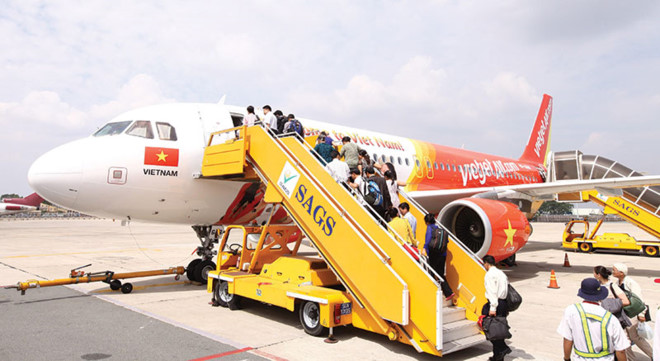Stock
commercial
- EXCHANGE
- GOLD RATIO
Corporate big guns join Japan investment promotion delegation
12:00 | 21/08/2017
For the August 21-24 visit to Japan, the Vietnamese delegation led by Minister of Finance Dinh Tien Dung will include a number of heavyweight corporates hoping to find Japanese partners to either participate in state divestment or establish long-term presence in Vietnam.
 |
The delegation, led by Minister of Finance Dinh Tien Dung, aims to appeal to Japanese investors with their stable operating platform and aspiration to expand.
Vietnamese businesses looking for expansion opportunities
With Sumitomo Life Insurance Company (Japan) as its strategic partner holding 18 per cent capital, as well as large foreign shareholders like Deutsche Bank AG, Target Value Fund, and CitiGroup Global Market Ltd., among others, BVH’s representative is expected to speak at the Conference on Investment Promotion in Vietnam in Japan.
BVH is also one of the top companies in Vietnam in terms of capitalisation on Vietnam’s stock exchanges (over VND39 trillion—$1.7 billion on August 16), and has maintained stable business performance for several years.
In 2012, Sumitomo Life became BVH’s strategic partner following HSBC’s divestment. Since then, Sumitomo Life has provided much-needed assistance for Bao Viet in developing products, diversifying distribution channels, implementing information technology in insurance business, and risks management, and in return, its investment in Bao Viet has been producing good results, with a dividend yield of 8 to 15 per cent each year.
Passing the target revenue of $1 billion is an important achievement according to BVH’s leaders, marking the company’s development as the leading Vietnamese insurance-financial corporation.
According to Dao Dinh Thi, chairman of BVH, with a capitalisation of nearly $2 billion and total assets of nearly $4 billion, the company will continue to utilise all its resources and prepare for further development.
BVH aims to affirm its brand in 2018, determine its position as a world-class company in 2019, and establish itself as the number one business on the market in 2020.
Vietjet Aviation JSC was listed on the stock exchange in February 2017, and so far has attracted only one big shareholder from Singapore, currently holding 5.1 per cent of its shares.
As an active company capable of catching up with the development trends of the aviation industry, Vietjet Air has enjoyed strong growth in the first six months of this year, earning a profit before tax of VND1.9 trillion ($83.6 million).
As of June 30, 2017, Vietjet Air’s total assets were VND24.95 trillion ($1.1 billion) and its shareholders’ equity was VND7.96 trillion ($350.24 million), increasing 50.8 and 130 per cent compared to the previous year.
Chu Viet Cuong, member of the managing board of Vietjet Air, will participate in the meeting with big investors in Japan to look for cooperation opportunities.
Large corporations like Vinamilk, Sabeco, and SCIC are expected to attract Japanese investors with the coming state divestments in 2017.
Vinamilk has decided to divest a further 3.33 per cent state capital, Sabeco received instructions from the government to divest all state capital, and SCIC has announced plans to divest state capital from more than 100 companies under its management. Aside from fetching the greatest benefit from divestment, these companies must also find capable investors that can assist sustainable development in the future.
MB Securities JSC (MBS) is one of the few financial intermediaries participating in the investment promotion delegation to Japan. The company has only recently listed on the stock exchange in 2016, after the long restructuring of Thang Long Securities.
According to Tran Hai Ha, CEO of MBS, the company expects to clean up all of its previous financial troubles, clearing the way for MBS to aim for a spot among the top three securities companies in Vietnam by 2020.
MBS’ current clients include more than 90,000 accounts, putting it firmly among the top five securities companies in Vietnam.
“A number of large investment funds have approached MBS to become strategic partners, including a number of funds from Japan. We want to expand our connections to find strategic investors who share our vision, business perspective, and wish to cooperate in the long term,” Ha said.
Policy reform to attract foreign capital
According to the Ministry of Finance (MoF), the total value of foreign indirect investments as of June 30, 2017 was $24 billion, increasing 38 per cent compared to the end of 2016. The number of foreign investors’ accounts was 20,564, up 6.3 per cent from the end of 2016.
In the first six months of 2017, foreign investors have bought VND9.3 trillion ($409.2 million) in shares and fund certificates, and VND14.4 trillion ($633.6 million) in bonds.
There are currently 22,000 foreign investors in Vietnam, 33 per cent of which are from Japan. Japanese investors are also favourites in Vietnam, as they not only bring high levels of technology development, but also an exemplary culture, discipline, and patience.
In the visit to Japan in June, the Vietnamese prime minister stressed the wish to promote further cooperation with Japan to create new values in the context of Vietnam’s commitment to build a government with better integrity to benefit people and businesses.
To increase foreign capital attraction, MoF said that it would continue removing barriers and increase restructuring mechanisms for equitisation, state capital divestment, and state ownership reduction.
The government will also promote listings of large-scale state-owned companies and decrease state ownership ratio.
After the government opened the derivatives market on August 10, the covered warrant product will be implemented at Ho Chi Minh City Stock Exchange. MoF also affirmed its commitment to resolve existing problems to bring the Vietnamese stock market from the marginal group to the band of developing stock markets.
Tran Van Dung, director of State Securities Commission of Vietnam, said that the commission is especially interested in improving the transparency of businesses and the stock market. For that, it is necessary to adjust businesses’ accounting standards to match international standards.
Tuong Vi
VIR










